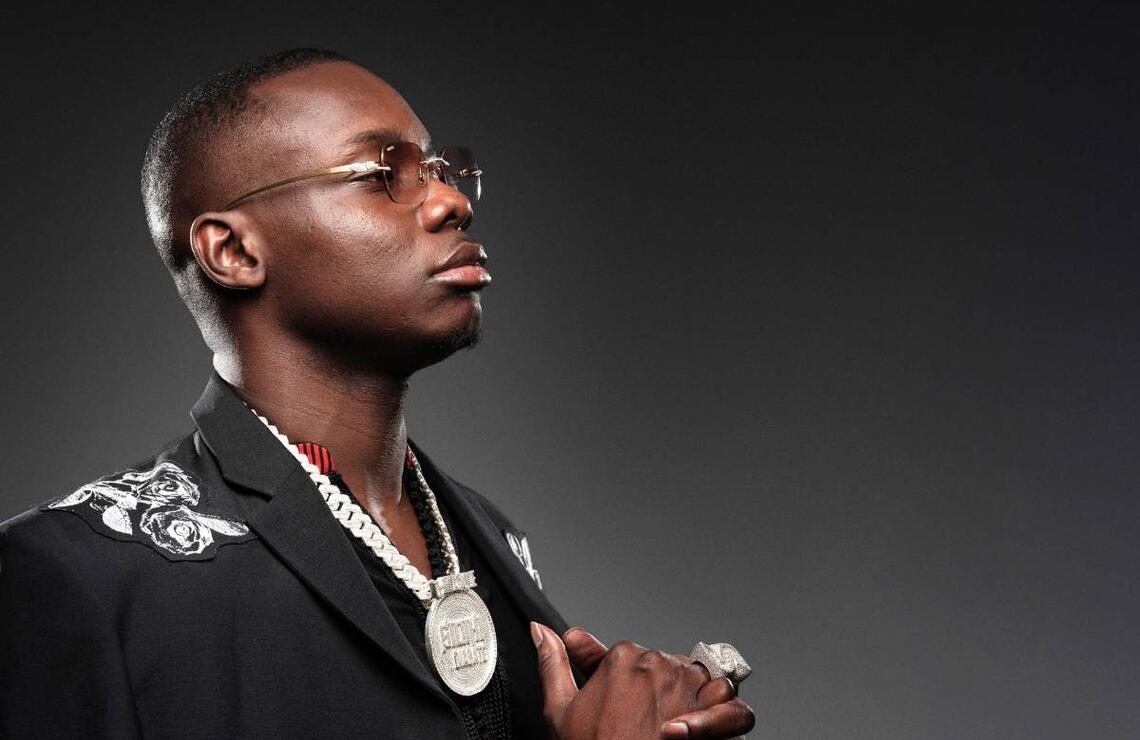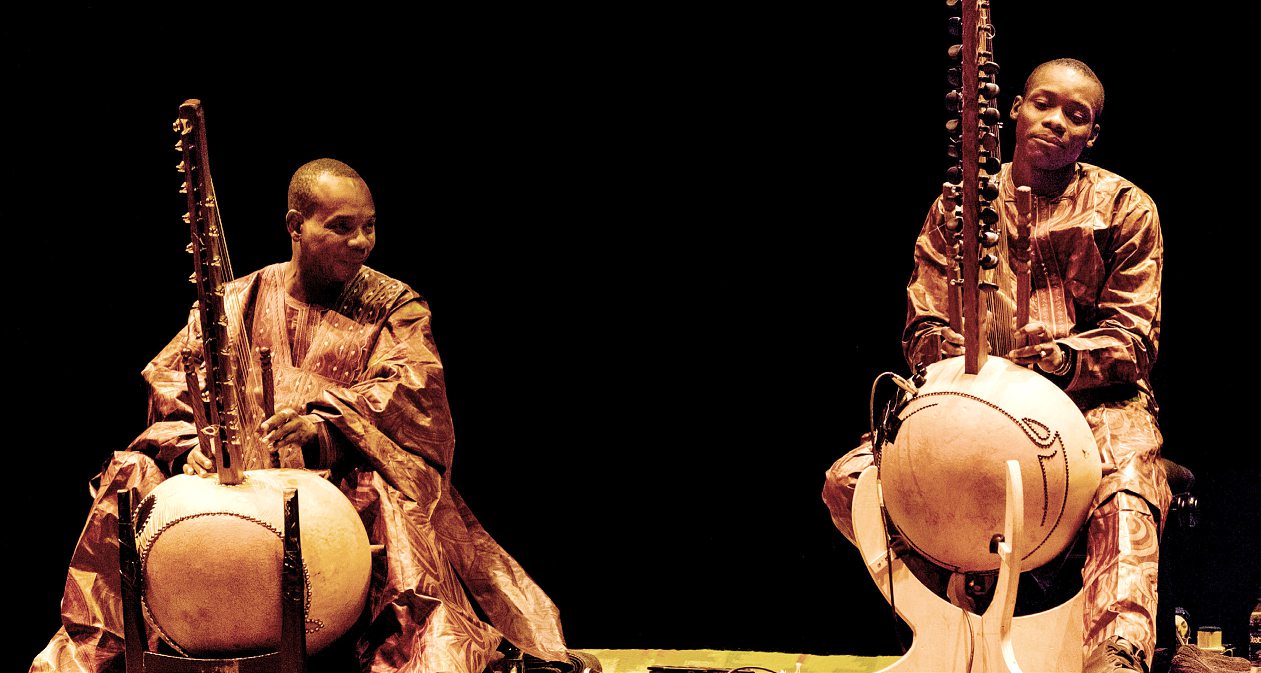
Sidiki Diabaté :
«Tradition is ever-present, and modernity is on the move»
Named after his legendary grandfather, he’s the son of the great Toumani, and heir to a long line of griots. Now he’s about to take the world by storm with the release of his new album, Kora Lover.

Sidiki Diabaté, prince of the kora, and the first Malian artist to play to a sold-out Bery Arena in 2023, presents us with a generous new work of nearly 30 tracks that fuse the timbre of this West African guitar with contemporary music. The lyrics evoke love, peace and solidarity through different musical genres and remarkable collaborations and guest appearances. Among the few well-known names are Dakar’s Wally Seck, Dystinct from Belgium and Morocco and Réunion’s Aznar Zahora. But this album is also an opportunity to pay tribute to his family history. With songs dedicated to his grandfather, Sidiki Diabaté, who introduced the world to the kora in the 1960s. And to his father, Toumani, a musical giant who passed away last summer. The two of them play together here on an intergenerational song, which sounds like a blessing and a final passing of the torch, which the artist fully intends to pass on to the new generations.
AM: The French tour for your new album, Kora Lover, kicked off in December. How have audiences responded so far?
Sidiki Diabaté: This tour is incredible! And the response from the audience has been very positive. We were pleasantly surprised. We didn't expect to see so many young people enjoying listening to music from Mali, Africa and the rest of the world, and taking pride in this new album. I think they needed to hear the lyrics we hear in Mali, in France and in other countries. You could see how happy they were to have us and I hope we can find the same energy in Paris on 8 February. I thank God every day for this album, this tour, this experience.
We’ve been waiting for the release of this album for at least a year. What took you so long?
I wanted to gather my thoughts first, and then create something of quality. I produced over 60 tracks and had to choose which ones to keep for the album, which wasn't easy. But in the end everything went well and I achieved what I wanted: a sound that was both traditional and modern.
You composed 60 tracks, 28 of which ended up on the album. Choosing them must have been a huge task.
Yes, but I didn't work alone. I had my father and my sister supporting me. It was a family effort. We always work as a family, but this time I was particularly happy to be able to do it. They were also proud to be able to help me. When my father was in hospital, my sister, my little brother Balla and I would sometimes be there too. We listened to the tracks, shared our opinions, selected them together, and finally kept the essential. For example, I absolutely wanted to include ‘Première Dame’ [‘La Femme du Boss’ on the album, Ed.], ‘Deniyo’ and ‘Alhamdoulilah Ça Va’. I wanted people to notice clear differences between the tracks. I also wanted the kora to be heard in very different musical genres. For me, the lyrics are also significant. And on these two points, we have had very positive feedback.
It's an album that’s also rich in “featurings” and collaborations. So you didn't just work with family?
That's exactly how it was, in fact. All the people who supported us are friends. They all love African music and wanted to be part of this album. It was an honour to have them, to include them. Take, for example, Dystinct featuring [the Belgian-Moroccan co-wrote ‘Ça Va Aller’, Ed.]: it's unheard of! This work with the kora is particularly innovative, and I'm sure it will still be talked about for months to come.
So are you going to internationalise your work?
Not necessarily. In any case, my songs dare to present something new, to send messages. Faced with current problems, particularly between Mali and France, we are telling the people: ‘Listen to us, culture will win. Let's leave politics and war aside: let's create culture together.’ Today, I represent an ethnic group, I represent the griots. In the Bambara language, ‘griot’ is jèli. And we use the same word for ‘blood’. We are the blood that flows through our veins and we must make ourselves heard. Evolving, too, through collaborations. Singing in French and Bambara to get our message across is important for France, for Mali, but also for the whole African continent and for Europe.
Do you think that music can help us overcome everything, including the geopolitical problems between different countries?
Anything is possible with music and culture. Bob Marley set the example. As did Toumani Diabaté, Salif Keïta, not to mention Youssou N'Dour. I share this state of mind. In my songs, I talk about love, peace and solidarity.
Your father, the master of the kora, Toumani Diabaté, passed away in July last year at the age of 58. He was always by your side. How are you coping with his passing?
As long as I live, as long as I am a musician, as long as his blood flows in my veins, my father will be there. He will always remain in my heart. So I can accept his passing with a certain peace of mind. Every time I pick up the kora, I can see him. Me playing this instrument is thanks to him. I will never be able to thank him enough for all the lessons he taught me. I just hope to live up to his expectations, to what he always wanted for us, his family, and for his music.
You pay him a vibrant tribute on Kora Lover.
We played together on ‘Kanagniniyorodjan’, and I wanted to dedicate ‘Toumani’ to him. Initially, it was a song that I wanted to sing for him, to tell him that I was proud to be his son. He heard the song when he was in hospital, but we changed the lyrics slightly after his death to pay tribute to him. To be honest, finishing this album was very difficult. He was there when we were preparing it. Then I was alone in the studio with my kora. Not having him with me had a psychological effect. There are some songs that I can't listen to all the way through without crying.
‘Gambia’, a magnificent instrumental piece, is dedicated to your grandfather, after whom you are named.
My grandfather left Gambia to go to Mali. I took a traditional song from the country and transformed it using an Afrobeat rhythm, with kora and a little guitar. However, it respects the traditional lines, guidelines and arrangements.
After your father and grandfather, how are you innovating with the kora? You've always been particularly interested in rap. Has your playing style evolved again recently?
I was looking for other sounds, but I wanted to stay true to myself and to the kora. Even though I listen to everything, I think you can't evolve without listening to others and sharing music. I was born into this tradition. My aim is to pass it on to the next generation, because it must be preserved. I think I share the same desire as the African continent: to pass on traditions.
Let's talk about the new generations. What relationship do young people in Mali and West Africa have with tradition?
Young people seem more inspired today. They also have more resources than we did back then. Traditionally, from an early age, the kora, calabashes, djembes and small balafons are our first toys. They stimulate us. There is nothing like it to create harmony between the person and their instrument. Even today, young people learn to play the kora correctly, as tradition dictates. After that, they’re free to do what they want with this training. What's more, the younger generations have the advantage of being able to go onto YouTube, iTunes, etc. They can listen to all kinds of artists and styles, and modify chords and harmonies using high-quality software like FL Studio, Logic, Cubase, etc. When I started out, I didn't have all these options. Young people are inspired. They each want to play in their own way and share what they do on social media. Our music is evolving. Tradition is still ever-present, but modernity is on the move: you have to live in the here and now.
So what's your latest musical revelation?
Recently, my little brother Balla took an old song, ‘Mali Sajo’, and arranged it in an incredible way. Think David Guetta, with traditional notes and the kora making up the melody. A younger, clubby rhythm, with well-chosen transitions. I was amazed to hear it, and proud of my little brother. In the years to come, people are going to be thrilled to hear everything that we can still do and create. For example, I worked on an album called Héritage with Matthieu Chedid, with whom I'd previously collaborated on the Lamomali project. The audience will be amazed by the work we've done. It's incredible!
So, in concrete terms, your role is also to make this energy heard and shared.
Every piece of music we’ve produced has made it to number one here. Our songs are everywhere: on the radio, in clubs... And we give others the chance to be heard. At our concerts, we bring in Malian artists to open for us. Personally, I try to feature more artists from the continent and I arrange productions for other musicians. My brothers Balla and Ahmed and I work on most of the hits that come out of Mali. And what comes out of it, frankly, is great: the level has gone up a lot in recent years.